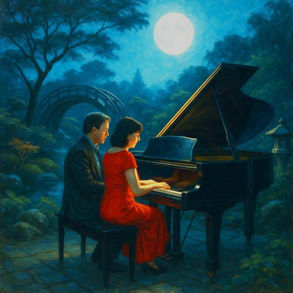Flower Piano Blooms
- John Ash
- Jul 31, 2025
- 4 min read
It began with three hours of music—Bach, Mozart, a Sonatina in G by Beethoven—all drifting through the apartment like incense. Elizabeth sat beside me at the piano, her fingers moving like falling rain. I was her student, older than most, more skeptical than some, preparing for a performance that made no logical sense: four solos and a concerto with the Los Angeles Philharmonic during San Francisco's Flower Piano Festival. The garden would bloom with music.

And so would I. I told her I wasn’t ready. My voice barely reached past the sidewalk trees, the kind that bloom too early and drop petals like confetti before anything even begins.
She didn’t flinch. Just looked through me, as if I’d already walked off the stage I hadn’t stepped onto.
“You are,” she said, gently but without room for debate. “You just don’t know what ready feels like.”
I stared at the cracks in the concrete, wishing they could open wide enough to offer an exit.
She stepped closer. “This is when you jump,” she whispered. “Not when it’s easy. When it’s blooming and wild and too loud inside your head.”
I couldn’t speak.
“All day,” she said. “All night. Practice like you’re already in the middle of it. And don’t think so much.”Her voice softened. “Just play.
The meeting room fell silent as Elizabeth gently closed the piano lid. No final words, no reassurances. Just the quiet certainty of music left suspended in the air. We walked the hotel corridor in near silence, down the escalator, past the faint smell of burnt coffee and nerves. Outside the Hyatt, Union Square was no longer itself. The Los Angeles Philharmonic had arrived—chartered in on a 747, then bused directly from the airport. Their instruments, encased in velvet-lined coffins, were already being unpacked like royal relics. Earlier, the SFPD had swept the plaza—dogs, scanners, a quiet ballet of intent—to clear the space of explosives and bad intentions. It was all too much, like a novel written in reverse, and I was supposed to perform it.
I watched from the curb as musicians unloaded. Then, the world tilted.
A gang, like something conjured from a dream half-remembered, descended on the square. They weren’t teenagers—they were shadows in windbreakers, masks over hollowed eyes. One of them pulled a gun, fired it. The bullet spun the air. Cops responded in a syncopated rhythm of percussion and breath. The thief’s body jerked, bloomed red, then collapsed into silence.
Elizabeth stood beside me. Then she wasn’t. A puff of wind. A shimmer. Blood on my glasses.
I ran to the banquet hall. She was there. At the piano. As if nothing had happened. She played the Minuet in G. Not Bach’s, really—but the version everyone thinks is his. It didn’t matter. Her fingers conjured light.
"Elizabeth," I said.
She turned. Her eyes were deep wells. In the corner of one eye, a single tear floated like a planet. My reflection swam inside it. But it never fell.
She nodded toward the bench. "Play."
I obeyed. My hands moved like they were someone else’s. Hers, maybe. The Minuet poured from the instrument as if it were being written anew.
She hovered. Not sitting. Not touching. Just... there. Her presence radiated from her skin like heat from summer asphalt.
And then—gone.
I called her room. No answer. I returned to mine. A blinking red light on the phone. Her voice: "8:30 p.m. Japanese Tea Garden. Come alone."
The Taj bar. I met Francois Dubois. All black. All ego. A pianist from New York with fingers like surgical knives and a tongue to match.
"What are you playing?"
"Minuet in G."
He scoffed. "Pablum."
We argued. Arm-wrestled. I let him live. My teacher hadn’t taught me to break bones. She had taught me to play.
"She’s not here to defend herself," he said.
"She disappeared. Then reappeared. Then vanished again. Like a chord unresolved."
A news flash blinked across the screen behind the bar. Footage: the shooting, the chaos, me, Elizabeth—then her disappearance.
"She was hit," Francois whispered.
I saw it too. But she played the Minuet after that. So, who was I to believe?
The Japanese Tea Garden shimmered in the dark. No moon. Only a hush of wind, and a Yamaha grand like a sleeping animal. The rain cover slid off as if moved by invisible fingers. Middle C rang out on its own.
I sat. Played a C chord. Held the pedal.
Elizabeth appeared. A white dress. No sound of footsteps. No shadow. She sat beside me.
We played. She guided. Her hands glowed, not attached to anything. They moved like constellations above mine, conducting my bones. I played better than I ever had. The Minuet became something sacred.
She whispered, "Let go. Let it speak."
I did.
And when it ended, the notes still vibrating, I looked beside me. Empty.
She had vanished.
The next morning, the emcee took the stage.
"It is with great sorrow that we announce the passing of Elizabeth Barlow, pianist and mentor. She died in the line of fire—an innocent bystander, caught in the chaos of violence and music."
But I knew.
She wasn’t gone. Not really. She was in my fingers, in the bloom of every chord, in the dream that plays itself long after waking.
And somewhere, in the silence between notes, her tear still holds my reflection.
Bach’s Minuet in G, it’s said, was written by Petzold, not Bach. But who owns a melody, really? The one who pens it—or the one who breathes it alive on a moonless night in a flower garden, hand-in-hand with a ghost?













